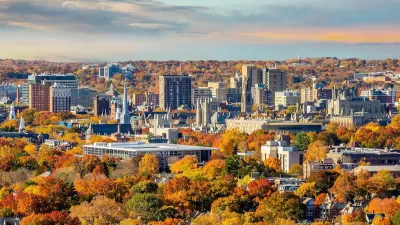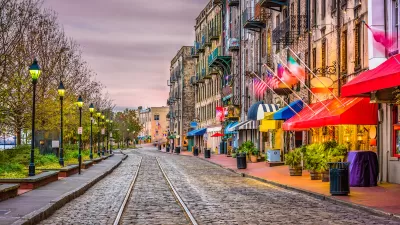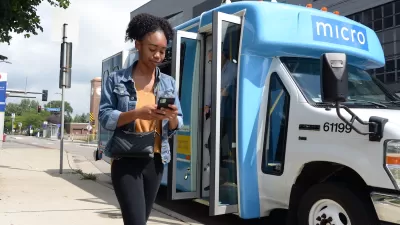The Guardian U.K. observes that the end of cheap oil is changing driving habits, boosting public transit use and encouraging localization. In short, they are making America a bigger place.
"It is known as the Inland Empire: a vast stretch of land tucked in the high desert valleys east of Los Angeles. Once home to fruit trees and Indians, it is now a concrete sprawl of jammed freeways, endless suburbs and shopping malls.
But here, in the heartland of the four-wheel drive, a revolution is under way. What was once unthinkable is becoming a shocking reality: America's all-consuming love affair with the car is fading.
Surging petrol prices have worked where environmental arguments have failed. Many Americans have long been told to cut back on car use. Now, facing $4-a-gallon fuel, they have no choice."
"In the face of expensive fuel and crashing property prices, the one-time embodiment of a certain American dream will become crime-ridden, dotted by empty lots and home to the poor and unemployed. That is already happening as crime and gang violence has risen in many suburban areas and tens of thousands of homes have been reposessed because of the mortgage crisis.
In effect, suburbs will become the new inner cities, even as once-abandoned American downtowns are undergoing a remarkable renaissance. Even malls, the ultimate symbol of American life since the war, are undergoing a crisis as consumers start to stay away.
But there are even deeper changes going on. The car, the freeway system and cheap air travel made America smaller. Everywhere was easily accessible. That, too, is ending. Higher fuel prices have dealt a terrible blow to America's airlines. They are slashing flights, raising costs and abandoning routes. Some small cities are now losing their air connections.
In effect, America is becoming larger again."
FULL STORY: America's love affair fades as the car becomes burden of suburbia

Alabama: Trump Terminates Settlements for Black Communities Harmed By Raw Sewage
Trump deemed the landmark civil rights agreement “illegal DEI and environmental justice policy.”

Planetizen Federal Action Tracker
A weekly monitor of how Trump’s orders and actions are impacting planners and planning in America.

The 120 Year Old Tiny Home Villages That Sheltered San Francisco’s Earthquake Refugees
More than a century ago, San Francisco mobilized to house thousands of residents displaced by the 1906 earthquake. Could their strategy offer a model for the present?

In Both Crashes and Crime, Public Transportation is Far Safer than Driving
Contrary to popular assumptions, public transportation has far lower crash and crime rates than automobile travel. For safer communities, improve and encourage transit travel.

Report: Zoning Reforms Should Complement Nashville’s Ambitious Transit Plan
Without reform, restrictive zoning codes will limit the impact of the city’s planned transit expansion and could exclude some of the residents who depend on transit the most.

Judge Orders Release of Frozen IRA, IIJA Funding
The decision is a victory for environmental groups who charged that freezing funds for critical infrastructure and disaster response programs caused “real and irreparable harm” to communities.
Urban Design for Planners 1: Software Tools
This six-course series explores essential urban design concepts using open source software and equips planners with the tools they need to participate fully in the urban design process.
Planning for Universal Design
Learn the tools for implementing Universal Design in planning regulations.
Clanton & Associates, Inc.
Jessamine County Fiscal Court
Institute for Housing and Urban Development Studies (IHS)
City of Grandview
Harvard GSD Executive Education
Toledo-Lucas County Plan Commissions
Salt Lake City
NYU Wagner Graduate School of Public Service





























